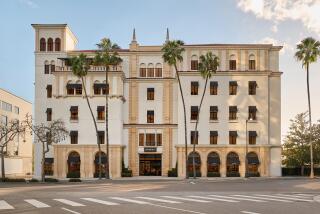BAT Industries to Sell Assets in Bid to Stymie Goldsmith
- Share via
London’s BAT Industries, moving to thwart a $22-billion hostile takeover bid by British financier Sir James Goldsmith, said Tuesday that it will sell Saks Fifth Avenue, Marshall Field’s, Breuners and other retail interests to enhance dividends and boost share value.
In addition, BAT said it will buy back 10% of its shares and “significantly increase” its 1989 dividend. It also will spin off its British retailer and its international paper businesses into two new firms to be owned by present shareholders.
If approved by shareholders Oct. 19, the sweeping restructuring will prune one of the world’s largest conglomerates back to its original tobacco businesses and newer financial services interests, including Farmers Group, the Los Angeles-based insurer.
The deal also could begin a bidding war for Saks and Chicago-based Marshall Field’s--two of the most venerable names in retailing--at a time of upheaval in retailing. Canada’s Campeau Corp., for example, is selling Bloomingdale’s to raise needed cash in the face of intensive competition and slack consumer demand.
Goldsmith has said that if the takeover by his Hoylake Investments group succeeds, he would sell everything except the tobacco holdings that make BAT the world’s largest company in that industry. Hoylake and other BAT critics have complained that the firm’s diversified interests lead investors to undervalue its stock.
Goldsmith on Tuesday hailed the restructuring as “a first step” toward the unbundling of the conglomerate’s enterprises that he also would undertake. Hoylake, he added, will support the plan while continuing to press its takeover bid.
Besides Saks and Marshall Field’s, BAT also will sell Breuners, which has 57 stores in California, Arizona and Nevada and employs about 1,200 people. Also on the block is Ivey’s, a department store chain headquartered in Charlotte, N.C., with 24 stores in North Carolina, South Carolina and Florida.
But BAT would keep and build on Farmers, expanding financial services through cash flow generated by its tobacco businesses. They include Brown & Williamson Tobacco in Louisville, Ky., the nation’s third-largest tobacco company, whose brands include Kool, Viceroy and Barclay.
If Hoylake succeeded in what would be history’s second-largest takeover after the $25-billion leveraged buyout of RJR Nabisco, it would immediately sell Farmers to a French partner, Axa Midi Assurances.
In London, analysts scratched their heads over Goldsmith’s enthusiastic response to BAT’s proposed reorganization, given its clear intent to undercut his bid.
“The timing is quite smart,” Robert Gibson of the London brokerage Robert Fleming told Reuters. With Goldsmith needing time to clear regulatory hurdles in the United States relating to the potential change in ownership of Farmers Group, BAT now will have a clear field on which to maneuver, he explained.
BAT’s new paper and pulp company would combine London-based Wiggins Teap and Appleton Paper of Appleton, Wis. Appleton is the world’s largest producer of carbonless paper and the nation’s top producer of thermal paper for facsimile machines. It has 3,600 employees and eight plants in Wisconsin, Ohio, Pennsylvania and Michigan.
The combined paper business will generate pretax profits of $342.8 million this year, BAT estimated.
‘Ideal Combination’
Argos, the new British retailing company to be spun off by BAT, is expected to post pretax profits of $101.9 million this year.
“The reshaped group has the potential to provide a rewarding investment for shareholders in the 1990s and beyond,” BAT Chairman Patrick Sheehy said. Financial services and tobacco are expected to contribute 1989 pretax earnings of $1.34 billion and $1.52 billion, respectively, or 80% of the company’s total, he said. “Together, these two businesses make an ideal combination with which to build shareholder value in the future.”
In outlining the reorganization plan to shareholders, Sheehy also said BAT is boosting its forecast for 1989 pretax earnings by 22% to $3.2 billion (assuming a pounds-to-dollars exchange rate of $1.616). He predicted that dividends would increase 49%.
According to a spokesman for Batus, BAT’s U.S. arm in Louisville, Ky., Farmers Group would be a big winner in the corporate overhaul.
“BAT feels very positive about the Farmers acquisition,” Batus spokesman Wilson Wyatt said. “It is prepared to concentrate its resources in that business and concentrate its attention on Farmers.”
BAT acquired Farmers last December for $5.2 billion, culminating more than a year of mostly bitter maneuvering. Ironically, Farmers now has assumed a special tactical value in BAT’s attempt to thwart Hoylake since insurance in the United States is regulated by state commissioners who must rule on the suitability of any change in ownership of companies headquartered within their states.
French Firm Cooperating
Farmers has insurance subsidiaries in nine states, including California, and Goldsmith has so far failed in attempts to persuade federal court judges in each of them to preempt the states, arguing that federal law should prevail in what he considers a foreign affair.
Meanwhile, Goldsmith’s French partner, Axa Midi, is cooperating with the states, and at least three of them have set hearing dates for next month. Under Axa Midi’s agreement with Hoylake, it would pay Hoylake $4.5 billion for Farmers as soon as the takeover succeeded. Axa Midi also holds a 15% stake in Hoylake.
More to Read
Inside the business of entertainment
The Wide Shot brings you news, analysis and insights on everything from streaming wars to production — and what it all means for the future.
You may occasionally receive promotional content from the Los Angeles Times.









